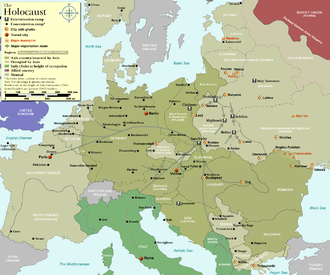Kereta api Holokaus
| Kereta api Holokaus | |
|---|---|
 Yahudi Polandia menaiki kereta api di Umschlagplatz, Ghetto Warsawa, 1942. Situs tersebut sekarang dijadikan monumen nasional Polandia. | |
| Operasi | |
| Periode | 1941 – 1944 |
| Lokasi | Jerman Nazi, Eropa yang diduduki Jerman, negar-anegara Blok Poros di Eropa |
| Para korban tahanan | |
| Tujuan | Ghetto transit, kamp konsentrasi Nazi, kamp buruh paksa dan kamp eksterminasi |

Kereta api Holokaus adalah transportasi kereta api yang dijalankan oleh sistem perkeretaapian nasional Deutsche Reichsbahn di bawah kontrol Jerman Nazi dan sekutu-sekutunya, dengan tujuan deportasi paksa Yahudi serta korban Holokaus lain, menuju kam konsentrasi Nazi, kamp buruh paksa dan kamp eksterminasi.[1][2] Eksterminasi orang-orang yang ditargetkan dalam "Solusi Akhir" tergantung pada dua faktor: kapasitas kamp-kamp kematian untuk menggas para korban dan pembuangan cepat terhadap jasad-jasad mereka, serta kapasitas kereta api untuk mengangkut korban-korban dari ghetto-ghetto Nazi menuju kamp-kamp eksterminasi.
Catatan kaki[sunting | sunting sumber]
Kutipan[sunting | sunting sumber]
- ^ Prof. Ronald J. Berger, University of Wisconsin–Whitewater (2002). Fathoming the Holocaust: A Social Problems Approach. Transaction Publishers. hlm. 57–58. ISBN 978-0202366111.
Bureaucrats in the Reichsbahn performed important functions that facilitated the movement of trains. They constructed and published timetables, collected fares, and allocated cars and locomotives. In sending Jews to their death, they did not deviate much from the routine procedures they used to process ordinary train traffic.
- ^ Simone Gigliotti, Victoria University, Australia (2009). The Train Journey: Transit, Captivity, and Witnessing in the Holocaust. Berghahn Books. hlm. 36, 55. ISBN 978-1845459277.
Referensi[sunting | sunting sumber]
- Dawidowicz, Lucy S. (1986). The War Against the Jews, 1933–1945. New York: Free Press. ISBN 978-0-02-908030-6.
- Hilberg, Raul (2003). The Destruction of the European Jews. New Haven, Conn.: Yale University Press. ISBN 978-0-300-09557-9.
- Kranzler, David (2000). The Man who Stopped the Trains to Auschwitz: George Mantello, El Salvador, and Switzerland's Finest Hour. Syracuse, N.Y.: Syracuse University Press. ISBN 978-0-8156-2873-6. Winner of the 1998 Egit Prize (Histadrut) for the Best Manuscript on the Holocaust.
- Gurdus, Luba Krugman (1978). The Death Train: A Personal Account of a Holocaust Survivor
 . New York: National Council on Art in Jewish Life. ISBN 978-0-89604-005-2.
. New York: National Council on Art in Jewish Life. ISBN 978-0-89604-005-2. - Hedi Enghelberg (1997). "The Trains of the Holocaust". Enghelberg.com, revised.
Pranala luar[sunting | sunting sumber]
Wikimedia Commons memiliki media mengenai Railway use for Holocaust.
- Transports to Extinction: The Holocaust Deportation Database on the Yad Vashem website
- Video of deportation, unknown location in Poland by SS and Polish Blue Police.
